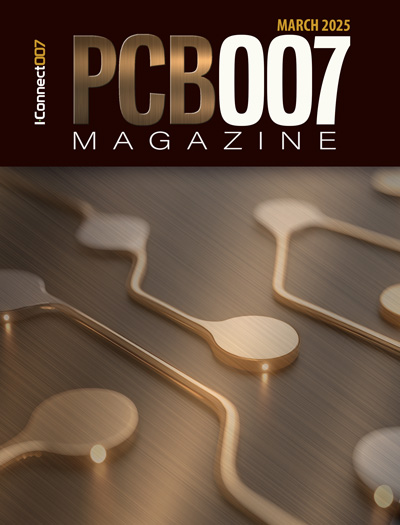-

- News
- Books
Featured Books
- pcb007 Magazine
Latest Issues
Current Issue
Voices of the Industry
We take the pulse of the PCB industry by sharing insights from leading fabricators and suppliers in this month's issue. We've gathered their thoughts on the new U.S. administration, spending, the war in Ukraine, and their most pressing needs. It’s an eye-opening and enlightening look behind the curtain.

The Essential Guide to Surface Finishes
We go back to basics this month with a recount of a little history, and look forward to addressing the many challenges that high density, high frequency, adhesion, SI, and corrosion concerns for harsh environments bring to the fore. We compare and contrast surface finishes by type and application, take a hard look at the many iterations of gold plating, and address palladium as a surface finish.

It's Show Time!
In this month’s issue of PCB007 Magazine we reimagine the possibilities featuring stories all about IPC APEX EXPO 2025—covering what to look forward to, and what you don’t want to miss.
- Articles
- Columns
Search Console
- Links
- Media kit
||| MENU - pcb007 Magazine
IPC Welcomes Language in Senate Defense Appropriations Bill Supporting R&D on Lead-Free Electronics
October 21, 2021 | IPCEstimated reading time: 1 minute
The U.S. Senate Appropriations Committee this week released their fiscal year 2022 defense appropriations bill, which for the first time included language supporting further research and development (R&D) into the issues surrounding lead-free electronics in mission-critical applications.
IPC and its allies have called for a five-year, $40 million investment in a public-private R&D program to support the transition of various aerospace, defense, and high-performance (ADHP) electronics to lead-free technologies. To date, Congress has provided a combined $15 million for this purpose in FY20 and FY21.
The U.S. House version of the FY22 defense appropriations bill, which was approved by the House Appropriations Committee in August, included $7.5 million for this purpose. The new Senate language makes it more likely that such funds will be allocated as the legislation is finalized.
“The gap between commercial and defense electronics has grown as lead-free has become the norm in commercial technologies,” said Chris Mitchell, IPC vice president of global government relations. “Today’s defense electronics are now 15 to 20 years behind the commercial market in terms of the underlying technologies used, creating risks to supply chain resiliency and defense readiness. With lead-based electronics becoming more difficult and expensive for the Defense Department to procure, the transition to lead-free is imperative.
“We salute the leadership of Senate Appropriations Committee Vice Chairman Sen. Richard Shelby (R-AL) on this issue, and we call on Congress to ensure that at least $7.5 million for lead-free R&D is included in the final bill.”
IPC and its partners in the Pb-Free Electronics Risk Management (PERM) Council and the U.S. Partnership for Assured Electronics believe a sustained investment in lead-free R&D will yield more than $100 million in annual defense savings and improve military readiness and overall innovation. Participants in the R&D program include Purdue University, the University of Maryland, Auburn University, Binghamton University, Northrop Grumman, Raytheon Technologies, Lockheed Martin, BAE Systems, Boeing, Plexus, and many others.
Suggested Items
Hunting for Clues: Feng Xue Solving Circuit Board 'Crimes' With AOI Standard
05/08/2025 | Linda Stepanich, IPCWhen residents in sleepy English villages needed a top-tier detective to solve a murder, they called on Belgian super-sleuth Hercule Poirot, author Agatha Christie’s fictional detective famous for using his “little grey cells” to solve crimes. In the same way, IPC standards development committees, when creating a standard to detect defects in circuit boards using Automated Optical Inspection (AOI), call on IPC A-Team, Hercule.
IPC Strengthens Global Focus with Promotion of Sanjay Huprikar to Chief Global Officer
05/08/2025 | IPCIPC, the global electronics association, announces the promotion of Sanjay Huprikar to chief global officer. This newly created position reflects the association’s forward-looking strategy and industry needs to strengthen the electronics supply chain.
Navigating Global Manufacturing in an Era of Uncertainty
05/07/2025 | Philip Stoten, ScoopThe EMS industry faces unprecedented challenges as global trade tensions rise and tariff announcements create market uncertainty. In an overview of IPC Europe’s podcast, MADE IN EUROPE, industry experts from GPV and Zollner examine how these developments impact our businesses and customers, and what strategies will prevail in this new landscape.
Nick Koop Launches IPC Flex Design Class
05/06/2025 | Andy Shaughnessy, Design007 MagazineNick Koop is director of flex technology for TTM Technologies, and he’s been a staple of IPC’s flex committees for decades. He’s also a longtime flex design instructor, and he’s about to debut a new IPC class, Flex and Rigid-Flex Design for Manufacturability, which will run May 12–21. In this interview, Nick tells us about this new class and what attendees can expect to learn.
The Government Circuit: Trump’s Trade War Disrupts the Electronics Ecosystem
05/06/2025 | Chris Mitchell -- Column: The Government CircuitThere is certainly no shortage of work to be done in the IPC Government Relations department, as the U.S. waged a tariff campaign on practically every industrial country in the world and several countries embarked on high-tech initiatives with a mix of approaches to the crucial foundations of electronics manufacturing. Indeed, the breadth and speed of U.S. President Donald Trump’s tariff campaign continues to be a serious challenge for our industry.


